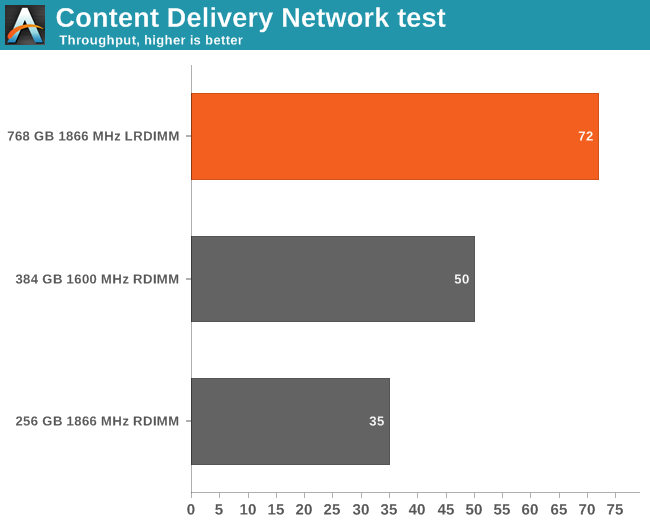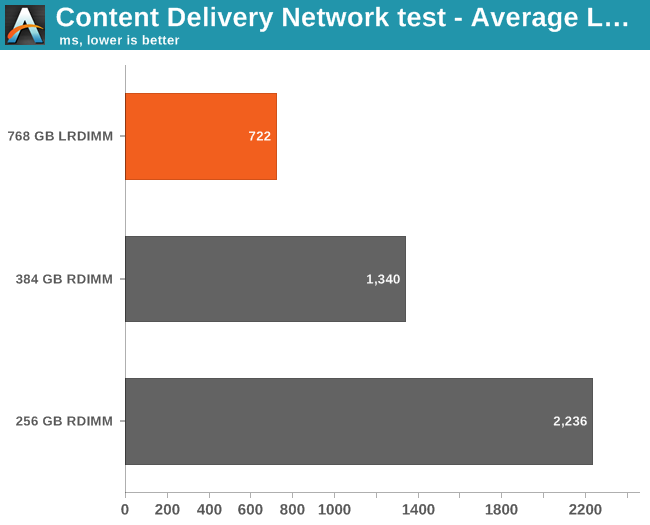Server Buying Decisions: Memory
by Johan De Gelas on December 19, 2013 10:00 AM EST- Posted in
- Enterprise
- Memory
- IT Computing
- Cloud Computing
- server
The CDN Results
Simulating thousands of users requesting one of the 173325 files on our CDN server was the hardest stress test that we've ever done.

The results are telling: doubling the amount of memory results in a very significant 44% speedup. It also results in tangible reductions in response time. Let us check out the average latency

The average latency of the LRDIMM equipped server is exactly half that of the 384GB RDIMM machine and one third (!) of the 2DPC RDIMM machine. That is very tangible advantage that results in big cost savings (half as many servers). Speaking of cost savings, let us find out what the energy bill will look like.










27 Comments
View All Comments
slideruler - Thursday, December 19, 2013 - link
Am I the only one who's concern with DDR4 in our future?Given that it's one-to-one we'll lose the ability to stuff our motherboards with cheap sticks to get to "reasonable" (>=128gig) amount of RAM... :(
just4U - Thursday, December 19, 2013 - link
You really shouldn't need more than 640kb.... :Djust4U - Thursday, December 19, 2013 - link
seriously though .. DDR3 prices have been going up. as near as I can tell their approximately 2.3X the cost of what they once were. Memory makers are doing the semi-happy dance these days and likely looking forward to the 5x pricing schemes of yesteryear.MrSpadge - Friday, December 20, 2013 - link
They have to come up with something better than "1 DIMM per channel using the same amount of memory controllers" for servers.theUsualBlah - Thursday, December 19, 2013 - link
the -Ofast flag for Open64 will relax ansi and ieee rules for calculations, whereas the GCC flags won't do that.maybe thats the reason Open64 is faster.
JohanAnandtech - Friday, December 20, 2013 - link
Interesting comment. I ran with gcc, Opencc with O2, O3 and Ofast. If the gcc binary is 100%, I get 110% with Opencc (-O2), 130% (-O3) and the same with Ofast.theUsualBlah - Friday, December 20, 2013 - link
hmm, thats very interesting.i am guessing Open64 might be producing better code (atleast) when it comes to memory operations. i gave up on Open64 a while back and maybe i should try it out again.
thanks!
GarethMojo - Friday, December 20, 2013 - link
The article is interesting, but alone it doesn't justify the expense for high-capacity LRDIMMs in a server. As server professionals, our goal is usually to maximise performance / cost for a specific role. In this example, I can't imagine that better performance (at a dramatically lower cost) would not be obtained by upgrading the storage pool instead. I'd love to see a comparison of increasing memory sizes vs adding more SSD caching, or combinations thereof.JlHADJOE - Friday, December 20, 2013 - link
Depends on the size of your data set as well, I'd guess, and whether or not you can fit the entire thing in memory.If you can, and considering RAM is still orders of magnitude faster than SSDs I imagine memory still wins out in terms of overall performance. Too large to fit in a reasonable amount of RAM and yes, SSD caching would possibly be more cost effective.
MrSpadge - Friday, December 20, 2013 - link
One could argue that the storage optimization would be done for both memory configurations.